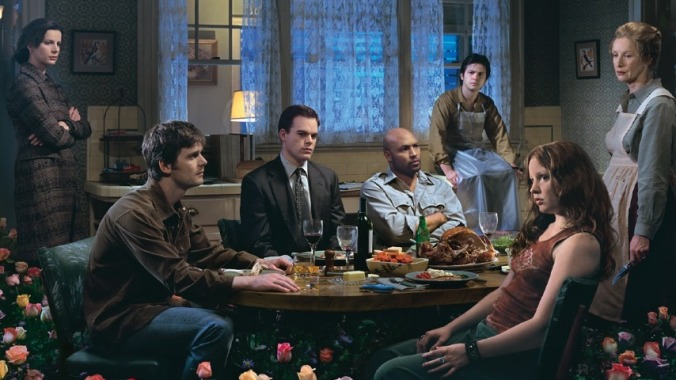TV Rewind: Six Feet Under Understood that Life’s a Funny Proposition After All
Photo courtesy of HBO
Editor’s Note: Welcome to our TV Rewind column! The Paste writers are diving into the streaming catalogue to discuss some of our favorite classic series as well as great shows we’re watching for the first time. Come relive your TV past with us, or discover what should be your next binge watch below:

The dead themselves never bothered me. Blotted red by settling blood, their skin was waxy and pallid, but I’m on the autistic spectrum. When most sensations displease, when the hum of fluorescent lights or the grit of your own teeth are an ordeal, you’re not taken back by one more.
The death certificates, on the other hand, did bother me. I collated them from row upon row of manila folders, their little name tags poking out of the sheaves like miniature headstones. I had filled those folders up by sweating the next of kin for information. “Playing the private eye,” my trainer called it. I had two days to learn from him—it was November 1st, the start of the busiest two months for funeral homes, and the Omicron wave had just hit Oregon.
His was a chivalrous point of view: the dogged shamus chasing down leads for some underdog cause. I always felt it was more like an audit of homewrecking, IRS caliber. They sit across from you, sifting through the wreckage of life as they know it, and you’re dispassionately running the numbers for a vast bureaucracy.
They overexplain because every detail seems… seemed so damn important. But the State wants to learn scant few things about you: birthplace, education, occupation, conjugation (marriage and immediate kin); where you lie dead, lay dying, and laid your head; when you punched in and when you clocked out. The rest? Tears in rain, as a replicant once said.
Some accounts told the stories we love to hear. A woman is born in Japan, dies in Oregon, and, when you look closely, the area codes of her kin crawl from east coast to west. Most rose and fell in the same county. For every Ph.D., two cases proved a truth you probably take for granted: one in five Americans can’t read this sentence.
You want to hear that Six Feet Under is true to the industry? Sure. Eerily so.
My funeral home was a little further on the corporate evolutionary tree than Fisher & Sons. Like Kroehner, it had multiple locations (six) and rock-bottom prices. Those locations fed into the central crematorium and mortuary chop shop that Rico calls a “body farm” in episode 10. Yet bigger fish always exist and a company from New York bought the business from its family, delivering my Kroehner to what would probably be the villain in a series reboot.
But the more profound feature of Six Feet Under is its lack of those comforting, taut arcs. Its stories have a messiness and recursion to them. David Fisher (Michael C. Hall displaying an emotional range he has not equaled since) starts the series with a boyfriend, breaks up with them, returns, breaks up again… In fact, every Fisher performs this bendy relationship dance. You never really know whether or not you’ve seen someone’s face for the last time.
That unpredictability extends to moods and the way the characters define themselves. Ruth Fisher attends a sort of Landmark Forum about “drafting a life blueprint,” gets that mad glint in their eye, and drives everyone batty with house metaphors.
-

-

-

-

-

-

-

-

-

-

-

-

-

-

-

-

-

-

-

-

-

-

-

-

-

-

-

-

-

-

-

-

-

-

-

-

-

-

-

-








































